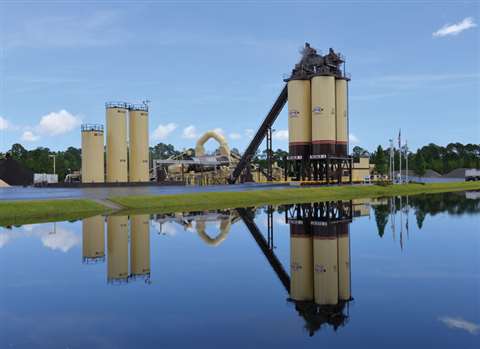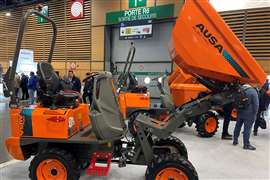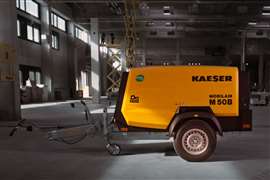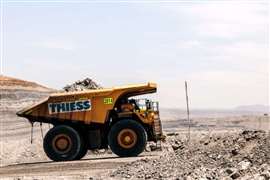Mixing Technology: What a mix up!
17 August 2016

In a rather more niche part of the construction equipment sector, there is a clear and definitive aim for manufacturers looking to improve their concrete and asphalt mixing plants – to produce more, at a faster pace, while moving the plants from one site to another with little or no hassle.
Dare I say this word again, but Bauma proved a successful week in the launch of several new mixing plants, with manufacturers going head-to-head in a bid to produce the best.
Kicking off is Germany-based Wirtgen, which said its new KMA 220i cold recycling mixing plant united the expertise and experience it has gained in several decades of cold recycling.
The company says it offers “outstanding mixing capacity” of up to 220 tonnes/h for the production of high-quality cold mixes from recycling construction materials.
The mobile plant offers easy setup and economically efficient mix production close to the construction site. It is also said to be environmentally friendly, in various ways, such as the truck transport between mix production and construction site being reduced, which has a positive effect on fuel costs. In addition, the source materials for mix production need neither be dried nor heated, which reduces CO2 emission even further.
The KMA 220i’s output of 220 tonnes/h is a 10% increase on its predecessor, while the plant carries a strong 6-cylinder diesel engine with an output of 129 kW, which the company says ensures an appropriate performance capacity of the mobile mix producer. When the mobile plant operates at a capacity of 200 tonnes/h, a full truck load of 18 tonnes of cold recycling mix can be produced every six minutes.
The KMA 220i is equipped with an own engine station, which is situated in a soundproof housing, and is beneficial to the environment. It can also be switched to an economical ECO mode during non-productive times.
Transport dimensions of 13.40 m in length (14.71 m including the cabin), 2.50 m in width and 4 m in height, as well as a total weight of around 29,950 kg enable the KMA 220i to be relocated quickly from one construction site to the next, said Wirtgen. A special permit is not required as the plant’s transport dimensions adhere to the international guidelines for road traffic. The complete mixing plant is also permanently mounted on a low-bed trailer.
Next is Benninghoven, part of the Wirtgen group, which has launched its new MBA 2000 mobile asphalt mixing plant, with 5-fold screening as standard. The company said that this means regulations across the world can be met.
The MBA also offers a less complicated modular extension of components, for example, the option of adding recycling material. This allows the customer to add up to 25% recycling material, depending on the base material.
The company claims that the MBA features high quality, low maintenance components with a long service life which meet any market and environmental requirements. Benninghoven also say that all aspects of health and safety, as well as cost-efficiency, has been examined, with the thermal insulation of the components in the heated section being “exemplary”.
The the wearing plates are also designed for a long service life and are adapted to the severe conditions such as hard stone and thermal loads. This, says Benninghoven, ensures constant functioning at all times, while the plants provide maximum performance.
The MBA’s functions and operating elements of the process control system are displayed in the computer animation and are controlled with a mouse or keyboard. The control system also offers the option of a manual operating level. This allows the mixing operator to control all actuators and valves separately.
Liebherr, meanwhile, has launched its new Mobilmix 2.5 concrete mixing plant which the company says offers flexible operation, with ease of transport and quick set-up time.
The company says this is advantageous for operating at sites with limited concrete production times or other challenging projects.
Compared to its predecessor – the Mobilmix 2.25 – the output capacity has been increased by 10 m³ to 110 m³ per hour. Liebherr said that customers can now expect even more efficiency through shorter cleaning times, lower wear and quick assembly times.
Another key feature of the Mobilmix 2.5 is a lowered mixer platform. The slight slope to the discharge hopper simplifies cleaning as well as the improved conditions and accessibility to the mixer system, says Liebherr.
A new keyless security system on the mixer access hatch also eases access for cleaning work.
Marini has launched two new batch-mix asphalt plants – the Xpress 2500 and the BE Tower – with the former in the premium segment of the market, the latter in the value segment, but both promising reliability, longevity and low maintenance costs.
All modules of the Xpress are wheel mounted and therefore said to be easy to transport.
The plant promises all the features of a stationary plant, including the production of up to 200 tonnes/h, with the potential to discharge directly into trucks.
The Xpress also claims flexibility, with the potential to install a double RAP metering line for up to 40% recycling – with one line feeding the ring on the dryer drum and the other line feeding directly into the mixer.
The BE Tower is designed with small and medium-sized companies in mind, with an output level of 160 tonnes/h. Said to be compatible with all techniques currently in use, it incorporates warm mix and 30% recycling.
The plant’s containerised modules arrive, protected from atmospheric degradation and accidental damage, while pre-cabling of electrics for each module and to the drum-filter bar claims advantages such as a 40% reduction in ground reduction requirements.
Meanwhile, Ammann’s concrete plants and mixers are developed by Ammann Elba, the company created when German-based Elba was acquired in 2014.
The new CBS Elba concrete mixing plant is designed for small- to medium-sized businesses seeking flexible concrete plant solutions. The company said that it featured state-of-the-art design based on customers’ needs, and offered output ranges from 105m³/h to 160m³/h.
The basic unit can accommodate both EMS and EMDW single-shaft and twin-shaft mixers with a hardened concrete output volume ranging from 2m³ to 3.5m³. Ammann said the CBS Elba offered easy, low-cost transportation for stationary and semi-mobile operation.
A new line of mobile and compact concrete-mixing plants also has been launched.
The first plant in the product family, the CBT 60 Elba Compact Concrete Mixing Plant, has an hourly output rate of 58 m³/h. The entire compact line-up, available in the near future, will provide a performance range from 30 m³/h to 130 m³/h.
The CBT 60 Elba is equipped with an Elba EMS 1000 single-shaft mixer and an integrated linear batcher for storing between two and four aggregate components. Ammann claimed fast installation times and trouble-free relocation resulting from the elaborate folding mechanisms. No foundation is required for plant installation.
SBM said its SBM Linemix 3000 is setting new standards to produce concrete directly on site.
The high-performance concrete mixing plant SBM Linemix 3000 CM 410-7 H, which produces concrete for tubbings (tunnel lining elements), represents an essential link in the chain of specialists working on construction sites.
In fact, Jürgen Steinhauser, responsible project manager of Austrian-based Hilti & Jehle, said of SBM’ Linemix 3000, “Only such a powerful and reliable plant can produce a total of 120,000 m³ high performance concrete for 50,000 tubbings in time in year-round 24-hour-operation.”
SBM said that with its Euromix concrete mixing plants, reductions in CO2 could be made as well as cost savings thanks to the mobility of the super mobile concrete mixing plants.
It said producing concrete directly on site reduced CO2 emissions by up to 25%, as the required concrete was produced in the immediate vicinity of the construction site resulting in “optimised building site logistics”.
The advantages of eco-friendly concrete production, it said, included just-in-time concrete production, reduced lorry traffic, rapid start-up and no need for foundations.
The SBM product portfolio includes the super mobile specialist Euromix 500 SM compact to produce UHPC (Ultra-High-Performance-Concrete).
There is also the Euromix 2000 SM, with a concrete output of 100m³/h which has been working successfully for more than 15 years.
Astec was the supplier of choice when Florida, US-based P&S Paving decided to build a new asphalt plant from the ground up, using the latest technology available on the market.
P&S Paving president Tim Phillips said, “The largest reason we went with the new asphalt plant was that we needed more storage capability. We wanted to test the mix; know what we have in the silo before it’s delivered to the roadway. Of course the technology has changed dramatically within the last 15 years and we wanted to take advantage of what’s out there.”
At the heart of the new plant is Astec’s latest Double Barrel XHR drum mixer, which can produce high quality asphalt even with as much as 65% RAP (at 5% moisture content) in the mix, and the high RAP capability was a key point for P&S Paving.
The Double Barrel XHR employs two mixing technologies - an outer chamber on the drum and an external mixer. Meanwhile the V-Pack stack temperature control system maintains as low an exhaust temperature as possible when running a high RAP/low virgin mix, because less virgin material in the drying portion of the drum could potentially result in high exhaust temperatures. In order to combat the high temperatures encountered when running high RAP content, the last half of the Double Barrel XHR drum is all stainless steel, including the combustion flights.
The outer mixing chamber on the dryer gently mixes reclaimed material with dry hot aggregates, maximising heat and binder transfer between RAP, aggregate, and selected admixtures in a rarefied oxygen atmosphere.
P&S Paving currently provides about 400,000 tons (363,873 tonnes) per year out of this one facility, and Astec made sure they have enough capacity to meet that goal comfortably.
Mr Phillips said, “With specifications getting tighter all the time, we know we have the best available equipment in the industry. We have all the tools, so now it’s just up to us to make good mix.”






